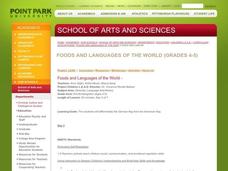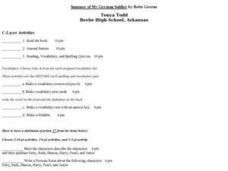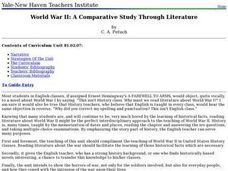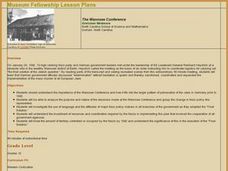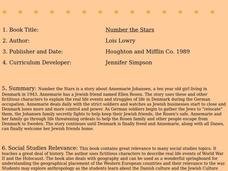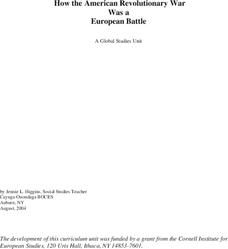Curated OER
Food and Languages of the World
Third graders become familiar with the German pickle, part of the Christmas celebration in Germany. In this German pickle lesson, 3rd graders listen to the story of the German pickle and its significance to the German Christmas...
Curated OER
Regular and Irregular Verbs in German
Learners review formation of present tense of regular verbs learned in German 1. Students complete a worksheet after viewing a PowerPoint show. They watch a second portion of the PowerPoint show about the peculiarities of irregular verbs.
Curated OER
Foods and Languages of the World
Young scholars compare and contrast the German flag to the American flag. In this diversity lesson plan, students view an example of the German flag and American flag. Young scholars list the differences and similarities between both...
Curated OER
Summer of My German Soldier
Students participate in a layered curriculum unit for a novel study. The teaching method allows for a student centered classroom that includes different methods of instruction and assessment.
Curated OER
World War II: A Compartive Study through Literature
Students examine World War II through the use of literature. As a class, they brainstorm a list of words they relate to the war itself. In groups, they read various novels and view photographs showing the experiences of the Jews,...
Curated OER
The Wannsee Conference
Twelfth graders examine what occured at the Wannsee Conference during World War II. Using documents, they discover how the conference fits into the final solution of the Jewish question. They analyze the language used and the attitudes...
National First Ladies' Library
Latin: The Language of Ancient Rome
Middle schoolers gain understanding about where some of today's words originated by reviewing a list of Latin words and their meanings. They work in small groups to create dictionary pages which will then be compiled into a large...
Curated OER
International Festival: Germany
Students complete several activities to learn about the German culture. In this German culture lesson, students read the 'Hansel and Gretel' story and create a paper gingerbread house. Students complete a matching game for the story....
Curated OER
Ages in Stages: An Exploration of the Life Cycle based on Erik Erikson's Eight Stages of Human Development
Examine Erikson's chart on the various stages one goes through growing up. Individually, they write a paper on whether or not they fit into those categories and how they are different today. In groups, for each stage they role play the...
Curated OER
Number The Stars
Students read a book about prejudices that occur in our daily lives. They describe characters in the book. Students discuss real life events of World War II and the Holocaust. Students simulate hiding Jews from the German soldiers. ...
Curated OER
The Cay
Fifth graders read The Cay as a shared literature experience. This lesson plan has many good activities across the curriculum to keep your students actively engaged in the story. They will do math, art, music, science and geography...
Curated OER
Introduction to the Graphic Novel Maus
Students begin reading the graphic novel "Maus". Using the Internet, they discover fundamental differences between Judaism and Christianity. Using excerpts from the novel, they identify animal metaphors used for nationalities and ethnic...
Curated OER
American Revolution: A European Battle
Learners create a timeline of events during the Revolutionary War and conduct research of historical figures. They construct acrostics or diamantes of the figures' names. They evaluate the involvement of Europeans in the war.
Curated OER
World War II Alien Enemy Control Program
Students review the history and language of the Alien Enemies Act and related laws as well as the Constitutional challenges it presents. They also review the World War II Alien Enemy Control Program and the Alien Enemy Hearing Board...
Curated OER
World War II Alien Enemy Control Program
Students review the history and language of the Alien Enemies Act, the meaning of writs of habeas corpus, and the various amendments to the Constitution covering issues of due process. They know how national security measures collide...
Curated OER
The Big Lie
Fifth graders create poems and other forms of writing.Then working in groups they share writing with each other. The opinions would be gathered and students would revise writing according to the comments.
Curated OER
Immigration and Identity
Young scholars will analyze four historical events: The Annexation of U.S. Southwest, The Mexican Revolution, The Great Depression, and World War II. They determine how each event affected immigration to the U.S. from Mexico and Central...
Curated OER
United States Entry into World War I: Some Hypotheses About U.S. Entry
High schoolers determine the most compelling evidence explaining why the U.S. entered WWI. They read and discuss a handout of reasons why the U.S. entered the war, and take a poll as to which reason was the most compelling.
Curated OER
Life Prior to Kristallnacht (1933-1938)
Students research the way of life of the Jews before Kristallnacht. Using new vocabulary and resources, they discover how carefree life was before the days of discrimination and antisemitism. In groups, they create a timeline of the...
Curated OER
Stimulus Response
Students explore the five steps in the stimulus-response pathway. They analyze the senses and the difference between animals' primary and secondary senses. Students collect information about animal behavior to debate the ethics of...




